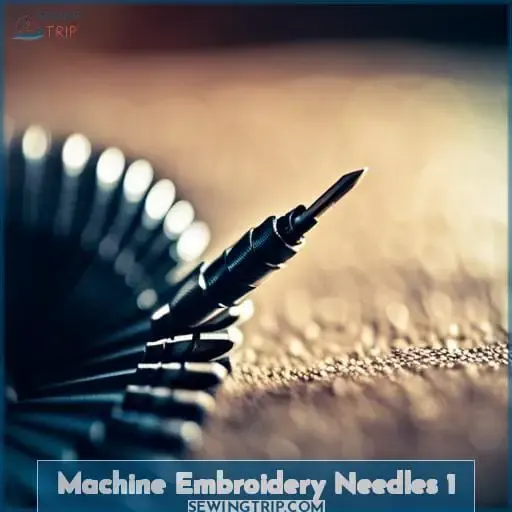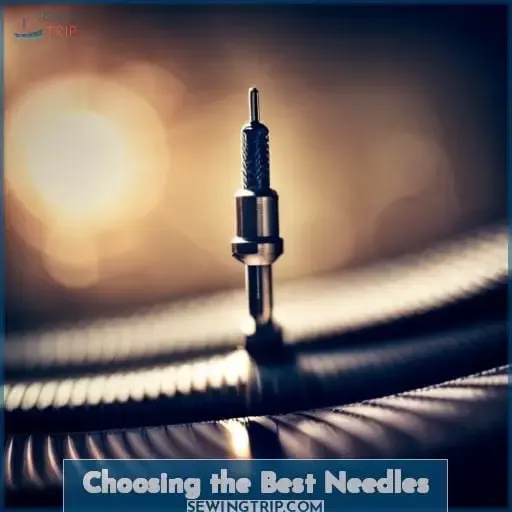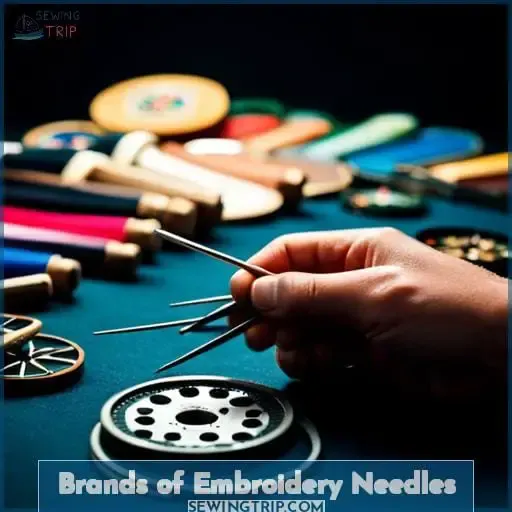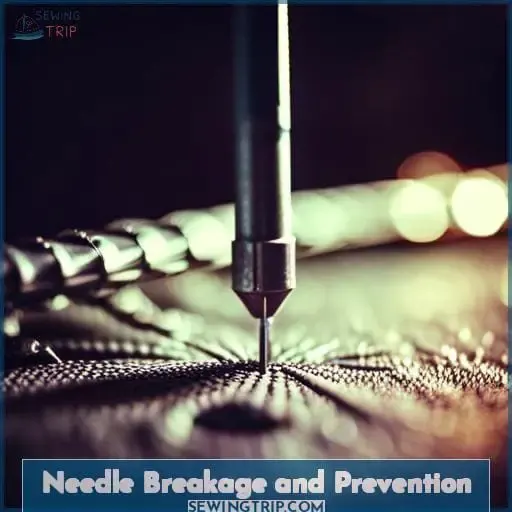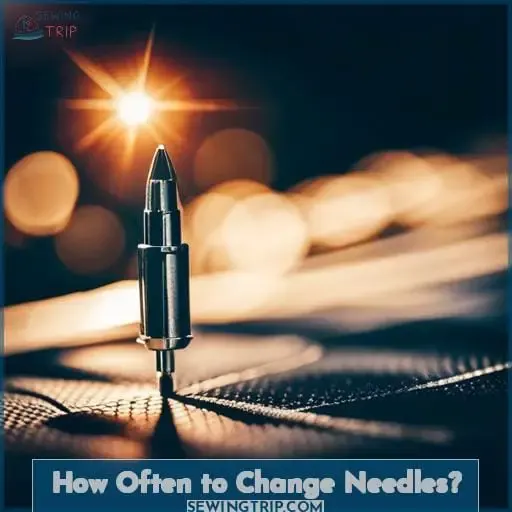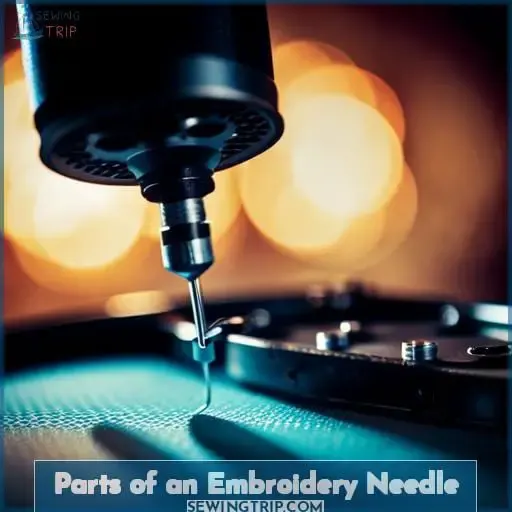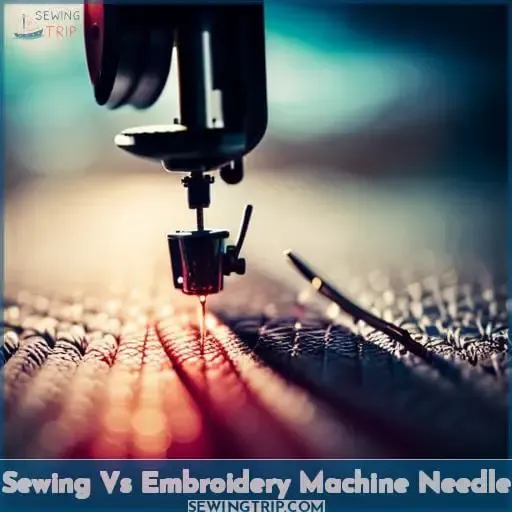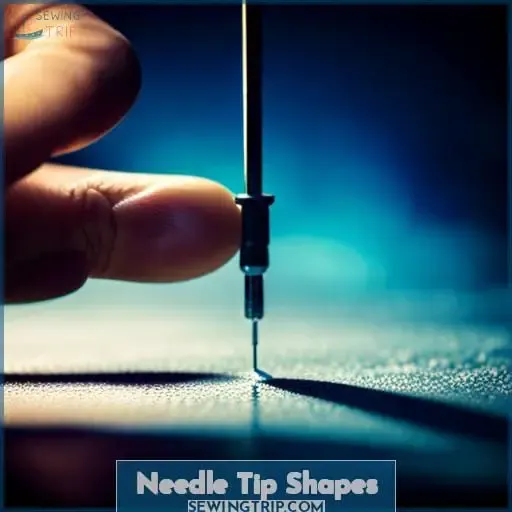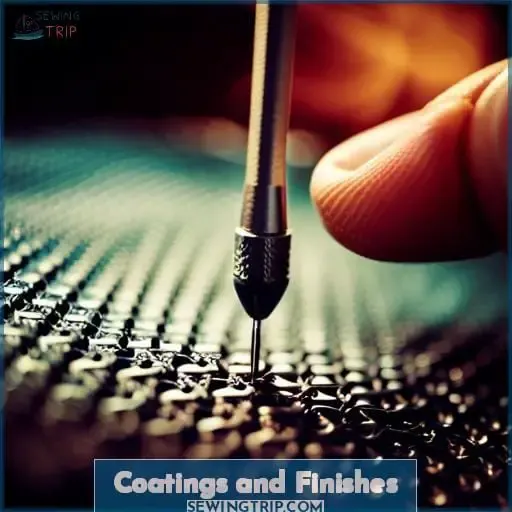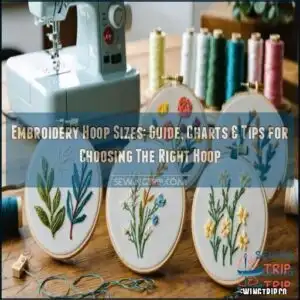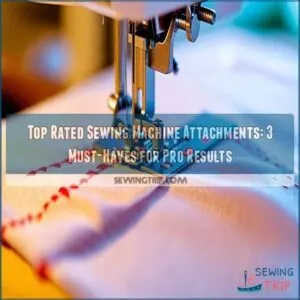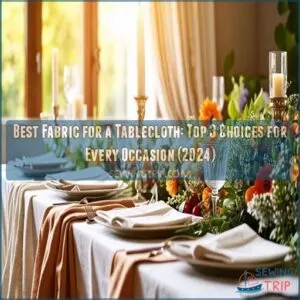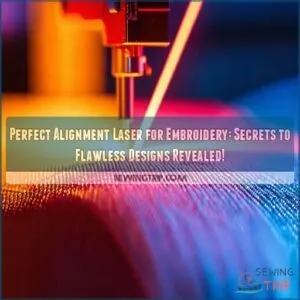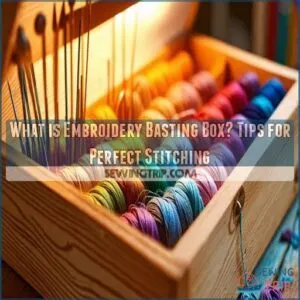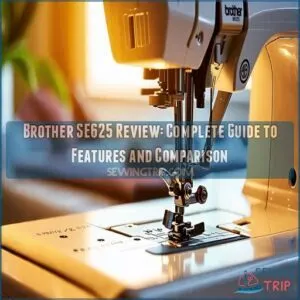This site is supported by our readers. We may earn a commission, at no cost to you, if you purchase through links.
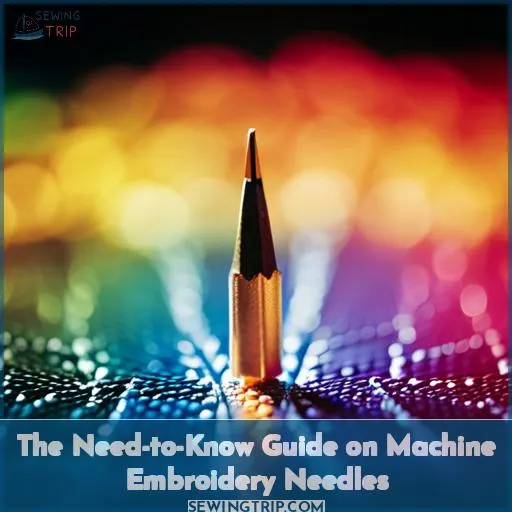 Greetings! Are you curious about machine embroidery needles? If so, you’ve come to the right place. Embroidering fabrics is a fun and rewarding activity that has been around for centuries. It’s no surprise then that there are plenty of tips and tricks when it comes to choosing the right needle – from size, type, point shape and more.
Greetings! Are you curious about machine embroidery needles? If so, you’ve come to the right place. Embroidering fabrics is a fun and rewarding activity that has been around for centuries. It’s no surprise then that there are plenty of tips and tricks when it comes to choosing the right needle – from size, type, point shape and more.
In this article, we will explore everything related to machine embroidery needles in order to make sure your finished projects look amazing every time! From universal versus machine-specific needles all the way through how often they should be changed out; this guide has got it all covered.
So let’s get started on our exploration of these tiny but powerful tools of creativity!
Table Of Contents
Key Takeaways
- Machine embroidery needles come in universal and machine-specific types.
- Needle sizes range from 65/9 to 110/18, with larger sizes for thicker threads.
- Coated needles offer improved wear resistance and ease of penetration through fabric.
- Proper maintenance and storage of needles is important for optimal performance.
What Needles to Use?
Whether you are a beginner or an experienced embroiderer, choosing the right needle for your project is essential. There are two main types of needles used in machine embroidery: universal and machine-specific.
Universal needles come in different points such as sharp, ballpoint, and universal, while machine-specific ones have sizes ranging from 65/9 to 110/18 with chrome-plated, titanium-coated, or Teflon coating options available.
It is important to consider factors like fabric type and thread weight when selecting a needle, as well as following manufacturer recommendations for best results.
Universal Vs Machine Embroidery Needles
Choosing between universal and machine embroidery needles can be tricky – but with the right knowledge, you’ll make sure your project turns out perfect! Consider needle sizes, coated needles, fabric type, and points to find a suitable fit for your design.
Ensure that breakage is avoided by using high-quality machine embroidery needles recommended by brands like Schmetz or Organ. Armed with this information, you will have the confidence to create beautiful projects no matter what material or thread type you use.
Types of Embroidery Needles
You can find the perfect needle for your project by selecting from a variety of embroidery needles, such as chrome-plated, titanium-coated, and Teflon-coated varieties with sharp, ballpoint, or universal points – all smoother than silk.
Needle selection should consider coating materials and thread types, as well as fabric choice. Organize your needles in a needle book to simplify projects! Deborah Jones’ Embroiderer’s Compass is an excellent resource to help you make the right choices for optimal results.
Needle Points
Discover the perfect needlepoint for your project – from sharp to ballpoint to universal! Needle types such as chrome-plated, titanium-coated, and Teflon-coated all offer smoother stitches than silk. Choosing a needle should consider thread type and fabric type along with design complexity.
Sharp points make small details easier but can wear quickly on dense fabrics; ballpoints work better on medium-weight fabrics; universals cover most needs.
Machine Embroidery Needle Sizes
To get the best results, choose a needle size that suits your project – ranging from 65/9 to 110/18! When selecting the right combination of needle point for design complexity, consider the thread type and fabric.
Sharp points make small details easier, but they may wear quickly on dense fabrics. Ballpoints work better on medium-weight fabrics, while universals cover most needs. Gold or titanium-coated needles provide smoother stitches compared to silk, while chrome-plated, titanium-coated, and Teflon-coated needles all offer improved wear resistance.
Choosing the Best Needles
Choose carefully to ensure the best results for your embroidery project. Various needle sizes, points, and coatings can make a big difference. Needle points come in three types: sharp, ballpoint, or universal. Coated needles are available in gold or titanium-coating options, which improve wear resistance and ease of penetration through fabric while stitching.
It is important to consider factors like fabric type and thread weight when selecting a needle.
Deborah Jones’ Embroiderer’s Compass is also an excellent resource if any questions arise about machine embroidery needles.
Brands of Embroidery Needles
Find the embroidery needles you need for your project among trusted brands such as Schmetz and Organ. Needle size, point type, and coating options should all be taken into account when selecting a needle for machine embroidery.
A sharp point is best suited to tightly woven fabrics like cotton or linen. Ballpoint needles are better at piercing through stretchier materials without damaging them. Universal points provide a good all-round solution that can handle most types of fabric.
Gold or titanium-coated needles offer improved wear resistance and can help ease penetration through dense fabrics, which is important when stitching high stitch count projects. It’s also essential to consider thread tension settings when choosing a needle, as this affects how easily it passes through the fabric layers below.
The right choice depends on factors such as design complexity and fabric weight, so make sure you purchase tips from reliable sources before making your selection! When using any brand of embroidery needle, make sure to check regularly that they are in good condition by looking out for signs of dullness or breakage.
If so, it may be time to sharpen them up with some careful honing techniques, which will keep them working optimally throughout your project’s lifespan.
With proper care and attention paid towards choosing the correct products combined with regular maintenance, achieving beautiful results from machine embroidery becomes much easier.
Needle Breakage and Prevention
When it comes to machine embroidery, one of the most important steps is selecting the right needle. Having a good understanding of thread tension and fabric types can help you make an educated decision when choosing your needles.
The size and type should also be taken into consideration. For example, sharp points work best on tightly woven fabrics like cotton or linen, while ballpoint needles are better suited for stretchier materials.
Coated needles offer improved wear resistance, making them ideal for high stitch count projects or densely woven fabrics. Gold- or titanium-coated varieties have been found to be particularly helpful in these cases.
It’s also smart to keep all your various sizes organized with a needle book so you always know which ones you need at any given time. Deborah Jones’ Embroiderer’s Compass provides comprehensive information about different brands, sizing charts, and more that will prove invaluable when making such selections! Unfortunately, though, no matter how careful we are in picking our tools, there may still come times where breakage occurs due to other factors such as improper threading technique or incorrect tension settings being used.
To prevent this from happening, it’s wise not only to take care with setting up machines correctly but also to regularly check whether needles show signs of dullness before proceeding with stitching each design element.
How Often to Change Needles?
It’s important to change your needles regularly in order to maintain optimal stitching quality – experts recommend replacing them at least every 8 hours of usage or after sewing a large project.
To make sure you are using the correct needle for your fabric and thread choice, here is a list of things to consider:
- Needle type (chrome-plated, titanium-coated, Teflon coated)
- Point type (sharp, ballpoint or universal)
- Needle size (65/9, 75/11, 80/12, 90/14 and 110/18)
- Coating material (gold or titanium coating).
Organizing all these different needles can be overwhelming but keeping them organized with a needle book will help ensure that you always have the right one on hand when needed.
Additionally, it’s wise to refer back often to Deborah Jones’ Embroiderer’s Compass as it provides comprehensive information about various brands sizing charts and more!
Taking care when selecting your machine embroidery needles is key – proper maintenance ensures they will last longer while helping achieve better results.
Parts of an Embroidery Needle
To ensure the highest quality stitching, it’s important to understand the different parts of an embroidery needle and how they work together. Needle types include chrome-plated, titanium-coated, and Teflon-coated needles. The point type can be sharp, ballpoint, or universal depending on your fabric choice.
Additionally, there are various sizes available from 65/9 to 110/18 with coatings such as gold or titanium that could suit your needs better than others.
Factors like fabric weight, thread count, and design complexity will also affect which needle is most suitable for a given job – but this doesn’t mean choosing a needle has become any easier! To make matters more complicated, each brand has its own sizing charts, so be sure to research carefully before making your final decision in order to achieve perfect results every time!
With proper maintenance, including regular cleaning after use, along with storing them correctly in a dedicated book when not in use, machine embroidery needles will last longer while helping produce beautiful stitches effortlessly every time.
Sewing Vs Embroidery Machine Needle
Understanding the difference between a sewing and an embroidery machine needle can be difficult.
The choice of thread tension, needle types, fabric selection, and storage are all factors to consider when selecting a suitable needle for your project. Needles range in size from 65/9 to 110/18 with coatings such as chrome-plated or titanium that could suit your needs better than others.
Schmetz and Organ are both excellent brands providing high-quality needles designed specifically for embroidery machines.
Additionally, certain fabrics may require special points like sharp or ballpoint depending on their weight and texture. Universal points tend to work best across most materials, though they may still miss some details due to their bluntness compared with other point types.
Keeping these pointers in mind while shopping around should help you find exactly what you need for successful results every time! Finally, it’s important not only to pick up properly sized needles but also to store them properly so they remain undamaged until ready for use again – keeping them organized is essential too!
Needle Tip Shapes
When selecting a machine embroidery needle, it is important to consider the tip shape. There are three main options: sharp, ballpoint, and universal. Sharp needles are ideal for piercing fabrics with minimal damage; ballpoints work best on medium to heavyweight materials like denim or canvas; and universals provide good results across all types of fabric but may miss some details due to their bluntness.
Sharp
You’ll want to look for a sharp needle point when you’re searching for the perfect embroidery needles. From chrome-plated to titanium-coated, there are various coating types available that can make your stitching projects easier.
It’s important to consider fabric type and thread count when selecting a suitable needle size – larger numbers mean thicker threads require bigger needles! Point types such as ballpoint or universal may work better depending on the weight and texture of the material.
Ballpoint
Ballpoint needles are ideal for materials with a tighter weave, as their slightly rounded tips help navigate around the fibers without damaging them. Perfect for quilting projects where precise stitching is required, ballpoint needles should be considered when selecting thread and fabric types.
Proper care and storage of all needle types is key to ensure optimal performance – chrome-plated, titanium-coated, or Teflon coated – so they remain undamaged until ready for use again.
Selecting the right size needle will depend on your project’s requirements. Larger numbers mean thicker threads require bigger sizes! When in doubt about which option is best suited to your needs, consult Debbie Jones’ Embroiderer’s Compass as a reference guide before starting any project.
Universal
Universal needles are the perfect choice if you’re stitching on fabrics with a combination of fibers. Their slightly rounded tips help navigate around them without causing any damage – ideal for quilting projects where precision is required.
To get the best performance from your needle selection, consider factors such as fabric type, thread type, and design tip before starting any project.
If you want to keep track of all your needles in one place, use a needle book or Deborah Jones’ Embroiderer’s Compass for detailed guidance.
With proper care and storage methods in mind – chrome-plated, titanium-coated, or Teflon coated – these high-quality tools will remain undamaged until ready for use again!
Coatings and Finishes
When choosing a needle for your project, you can find chrome-plated, titanium-coated, and Teflon-coated needles that provide the perfect finish, like an artist’s brush on canvas. Needle points come in sharp, ballpoint, or universal options to best suit the fabric you are working with.
Sharp needles work great on lightweight fabrics, while ballpoints excel at medium to heavy materials like denim or canvas. Universals offer good results across all types of fabric but may miss some details due to their bluntness.
To choose the best brand for your needs, consider Schmetz and Organ as top contenders, and make sure they match up with your machine model number if applicable. For organizing multiple sizes, look into purchasing a needle book, which will also help keep track of different thread weights used during each stitch session.
Finally, when selecting fabric, it is important to take note of its weave pattern as this has an impact on the overall stitching outcome.
Frequently Asked Questions (FAQs)
What is the difference between sewing and embroidery machine needles?
Embroidery needles are slightly longer and have larger eyes than regular sewing machine needles. They also typically have a sharper point designed to easily penetrate thicker fabrics with intricate designs.
What are the different types of needle tip shapes?
Ironically, needle tip shapes vary widely for any project. From sharp to ballpoint and universal, the perfect option depends on fabric type and design. For embroidery projects, try chrome-plated or titanium/Teflon coated needles from brands like Schmetz or Organ for optimal results.
What are the benefits of using coated needles?
Do you want to reduce needle breakage and improve fabric penetration? Coated needles offer several benefits, such as greater wear resistance, increased durability, smoother stitching on tough fabrics, and improved stitch quality.
How often should needles be changed?
Needles should be changed regularly to ensure quality and efficiency. To get the best results, swap out needles after every few projects or when you notice any signs of wear.
What is the purpose of a needle book for organizing needles?
A needle book is a convenient way to organize needles of all types and sizes. It’s an efficient, compact storage solution that can help you quickly find the right needle for your project. With its clear plastic pockets, it also makes it easier to see what supplies you have on hand – no more digging through drawers! Plus, having everything in one place helps prevent misplacing or losing them.
Conclusion
Conclusion
Ready to pick out the perfect needle for your next embroidery project? Remember that choosing the right needle is key to a successful outcome. Consider the fabric, thread, and design when selecting the right needle. Also, think about the needle’s size and point. For the best results, go for a chrome-plated, titanium-coated, or Teflon-coated needle. Top-of-the-line brands like Schmetz, Organ, and Klasse are sure to give you the edge. So, take a deep breath and stitch away like a pro. After all, as the saying goes, A stitch in time saves nine!

